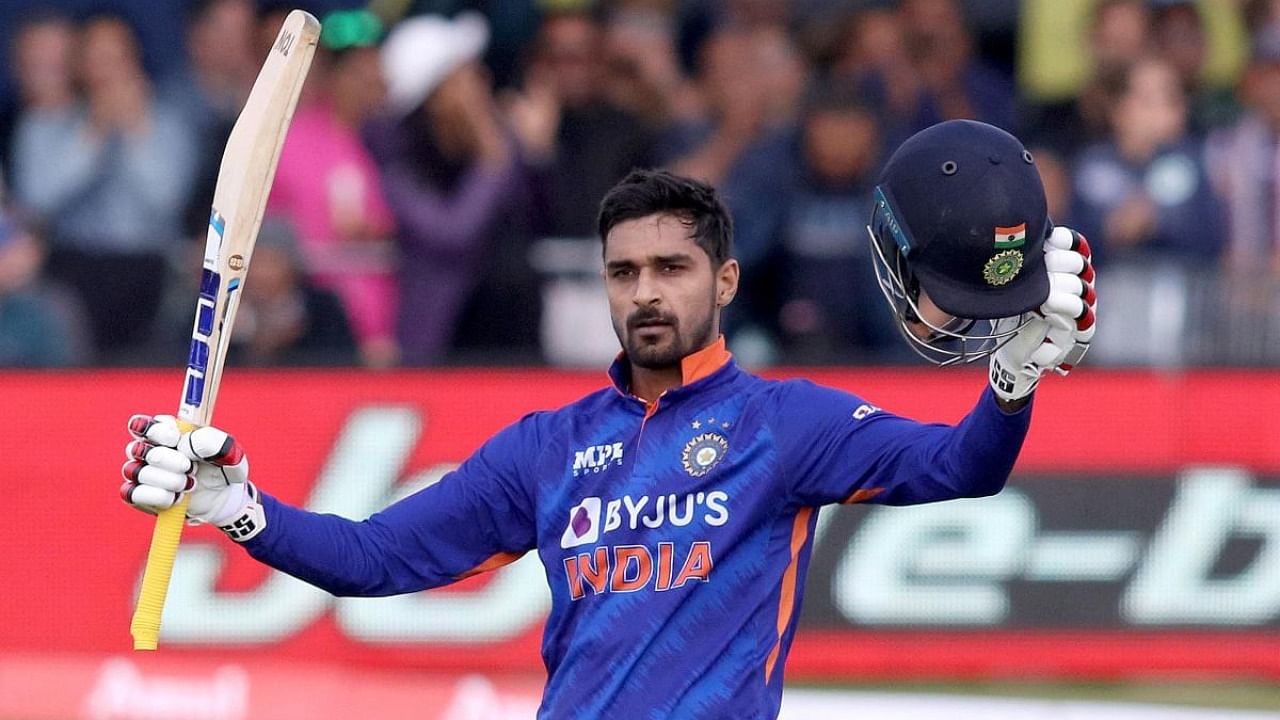
It's hard to imagine that just over a year ago, Deepak Hooda's career was at a crossroads. The latest India centurion wasn't happy with the way his then Baroda team captain, Krunal Pandya, was treating him and shot off a letter to the Baroda Cricket Association, complaining about the humiliation he was being subjected to ahead of the Syed Mushtaq Ali Trophy (SMAT) tournament in Vadodara. Krunal, Hooda alleged in the letter, had told him that he would never play for Baroda again.
It wasn't long before Hooda left Baroda and joined Rajasthan to pursue his domestic career. He had a decent Vijay Hazare Trophy, managing 198 runs in six innings. The right-hander went one better in the SMAT, hammering 298 runs in six innings at a staggering average of 73.50 and an impressive strike rate of 168.
The performance resulted in a fierce bidding for the all-rounder in the mega IPL player auction earlier this year when debutants Lucknow Super Giants snapped him up for a handsome Rs 5.75 crore. Interestingly, LSG also bought Krunal, shelling out more than Rs 10 crore, thus uniting the two feuding players.
This wasn't, however, the first such instance of IPL dynamics forcing the players with an acrimonious past to share the dressing room. Aussie Andrew Symonds, who passed away recently, played together with Harbhajan Singh for the Mumbai Indians.
R Ashwin, who had a run-in with Jos Buttler during the 2019 IPL, joined the Englishman at Rajasthan Royals this year. Hooda and Krunal since then seem to have buried the hatchet with the former striking a conciliatory note during the course of the IPL where they shared a few partnerships.
A middling domestic player until his fallout with Krunal, Hooda turned his fortunes for the better since he "made" the switch. Following a good IPL outing for LSG, he managed to retain his place in the Indian white-ball team where he has emerged as a viable opening option following his man-of-the-series exploits against Ireland in the two-match T20I series.
Pressed into a new role, Hooda, who has batted mostly in the middle or lower middle order, passed the test with flying colours. While he opened the innings in the first T20I, when he struck a 29-ball 47 (6x4, 2x6), he walked in at No. 3 in the second with only 2.3 overs into the innings. The 27-year-old raced to a 57-ball 104 to become only the fourth Indian to score a century in T20Is.
Though the opposition was inexperienced, the pitch a belter and the boundaries shorter, the alien conditions and the pressure of succeeding in a new role made his task that much more challenging. Hooda, however, betrayed few nerves and went about his demolition job like a veteran.
"I've never opened in an international game, but being a top-order batsman, you have to cope up to the challenges and you don't have any option," offered Hooda after the match. "And if you don't have any option, then why don't you go there like a warrior. That's how I think, and things turned in my way. I'm happy about that."
He indeed batted like a warrior, putting the opposition attack to the sword. He deposited the ball into the stands half a dozen times and sent it to the pickets on nine occasions. While Hooda has done more than one could have asked of him in the two-match series, is it enough to ensure a place for him in the squad when the full complement of first-choice players is available?
Hooda wasn't unaware of the situation.
"Yes, it is difficult to find a spot in the Indian team and then staying there," Hooda emphasised. "But at the same time when you're playing in India colours, that time you never think about yourself, you think about the team.
"That's what I think about on the ground. 'How can I contribute to the team in that situation?'. I don't think more than that, try to keep things simple. Yes, it's a matter of pride for me that I'm playing for India."